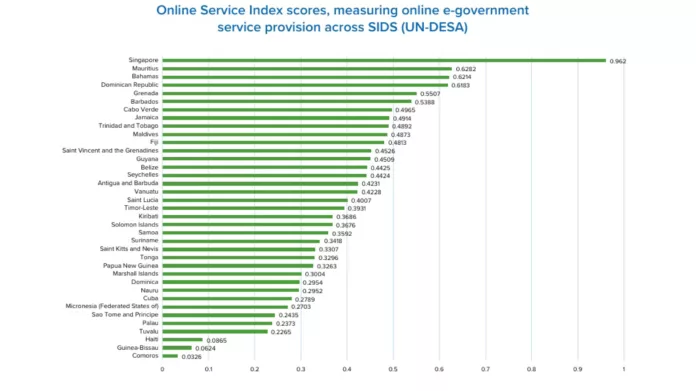
By Robert Andre Emmanuel
A report by the United Nations Development Programme (UNDP) has revealed that as small island developing states (SIDS) become more digitised, there is a need to build and strengthen digital public infrastructure.
The UNDP report, entitled ‘Small Island Digital States: How Digital can Catalyse SIDS Development’, was based on analysis from National Digital Readiness Assessments conducted among 16 SIDS nations, including Antigua and Barbuda.
The 180-page report was broken down into five main sections which focus on delivering a whole-of-society digital transformation, standards for development and deep dives into how to improve youth capacity to participate in the digital economy, improving data-driven decision making, and how creating a digital society can boost key sectors like tourism, agriculture, and public transportation.
According to the UNDP’s Calum Handforth who authored the report, many SIDS are pushing new digital frontiers, being at the forefront of advancing internet gender parity and building important components of cybersecurity.
“More and more public services are being digitalised, the coverage and quality of connectivity in SIDS is growing, and an exciting and dynamic digital culture is emerging in many of these island nations.
“The analysis moves beyond considering digital as an abstract consideration or a one-size-fits-all solution. Instead, it highlights how SIDS can put specific tools, technologies, and ideas to work for the benefit of their communities as technological developments continue to advance,” the report read.
A large part of the report spoke directly to this “whole-of-society” digital transformation, where the role of governments was discussed.
The report highlighted that while governments were moving some of their services online, limitations in dedicated funding for digital services, closed formatting of documents and data sets constrained the development of a wider digital ecosystem.
Among the key recommendations highlighted in the report was the need for the development of “digital service standards within the public sector to ensure that public services work for the entire population and that no one is excluded, including persons with disabilities”.
The report also stated that the evaluation of digital public services improvement remains a challenge and that governments should prioritise building digital service dashboards, embedding analytics into workflows and enhancing the analytical skills of civil servants to address this issue.
“Outcome-based or other approaches to performance management may also be worth exploring… [comprising] designing robust monitoring and evaluation resources and mechanisms, from improving the incorporation of user feedback to looking at standardised and cross-government oversight and reporting,” the UNDP report said.
The report highlighted a 2022 study by the UN’s Department of Economic and Social Affairs (DESA) in which Antigua and Barbuda was rated 16 out of 37 SIDS nations for online e-government services, and ninth out of all SIDS nations in the Caribbean.
A survey completed by the Ministry of Information and published by the UN DESA showed weaknesses in the twin islands’ government’s digital services, including a lack of a national e-government strategy, no measurement of user satisfaction of existing e-government services and a lack of legislation to deal with digital identity, data sharing among government ministries and open government data.
Earlier this year, Prime Minister Gaston Browne and acting Director of the e-government department in the Ministry of Information, Isoke Perry, were quoted by the UNDP as setting 2030 for the completion of full digitisation of government services.
The report also highlighted the need for more training and capacity building by young people and civil servants.
“Governments should explore every avenue to ensure that citizens can access and are aware of digital public services.
“This includes building inclusive and accessible public services and wider collaborations; for example, governments can work with mobile network operators to identify opportunities to drive further uptake of digital public services. This could encompass zero-rating data when citizens access government websites or other public services,” it added.
Another issue raised by the report was the lack of a monitoring framework for tracking digital transformation.
The report said that monitoring of the digital efforts was “ad hoc” and “inconsistent” across SIDS government agencies “without standards or shared targets”.
“This makes it challenging to consistently track progress, course correct, build on what does (or doesn’t) work and share information with the public,” it stated.
“These challenges stem from broader complexities. Monitoring digital transformation is a challenge in many SIDS for reasons including issues with the population-level representativeness of data and often low quality of available statistical data.
“National statistical offices and similar functions often struggle for resources and lack digital tools and processes. There is a lower level of statistical literacy in the wider public sector,” the report said.
Finally, on cybersecurity, the UNDP report highlighted the need to develop cybersecurity knowledge among the public, including encouraging shaping positive online and digital behaviours and positive “cyber-hygiene”.
One of the key recommendations highlighted was the need to conduct a cybersecurity audit of current cybersecurity systems and processes to identify opportunities, gaps and other challenges.
“This analysis should include identifying key gaps at the regulatory, organisational and technical levels that could then inform the basis for a national cybersecurity strategy and a comprehensive approach,” it said.
Antigua and Barbuda will host the UN’s fourth Small Island Developing States conference this May where one of the outcomes expected by government officials is the establishment of a global data hub in the country.
